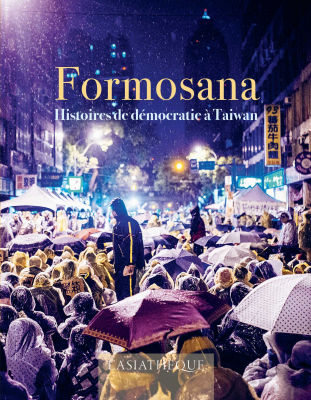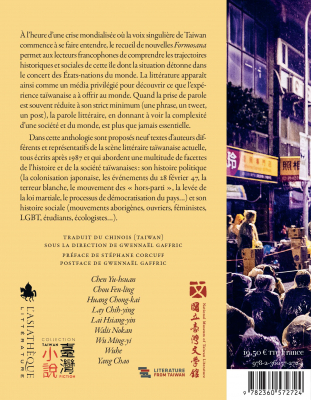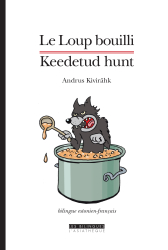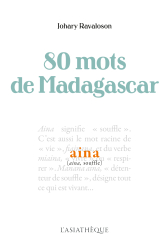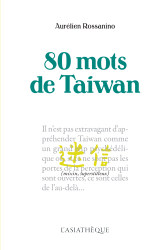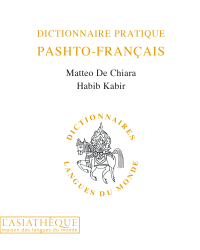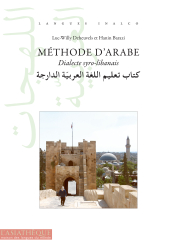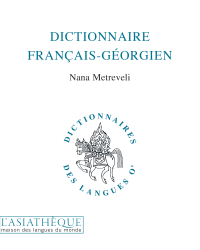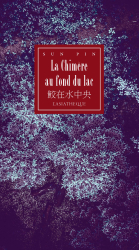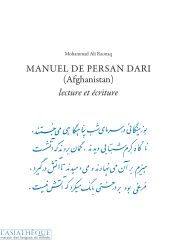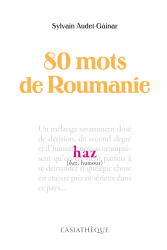Details
Format: Paperback
ISBN: 9782360572724
Collection: Taiwan Fiction
14 x 18 cm
Weight: 345 gr
Pages: 324
First publication: 03/02/2021
Last printing: 12/2020
CLIL: 4033
BISAC: FIC086000
Formosana
Histoires de démocratie à Taïwan
(Stories of democracy in Taiwan)
Translation: Stéphane Corcuff, Gwennaël Gaffric, Coraline Jortay, Matthieu Kolatte, Damien Ligot, Lucie Modde, Emmanuelle Péchenart
Preface : Stéphane Corcuff, Gwennaël Gaffric
A surprising literary journey into a young Taiwanese democracy
At the time of a globalized crisis when Taiwan's singular voice is beginning to be heard, Formosana, this collection of short stories, allows French readers to understand the historical and social trajectory of this island whose situation stands out in the concert of nation-states. Literature thus appears the ideal medium for exploring what the Taiwanese experience has to offer to the world. At ta time when speech is increasingly reduced to its bare minimum (a sentence, a tweet, a post), the written word, through illustrating the complexity of society and the world, grows more essential than ever. In this anthology, arranged by Gwennaël Gaffric, ten texts by different authors, all representative of the modern Taiwanese literary scene are compiled, all written after 1987, addressing various facets of Taiwanese history and society: its political history (the Japanese colonization, the events of 28 February 1947, the White Terror, the "non-party" movement, the lifting of martial law, the democratization of the country and so on) and its social history (aboriginal movements, workers, feminists, LGBT, students, environmentalists…).
PRESS REVIEW
“This book “Formosana” offers a very original approach to this country, “an anomaly” according Gwennaël Gaffric, through nine carefully selected literary short stories.
These texts have an astonishing organic force."
“... Between history and contemporary social movements, we discover a living society that it is important for us to know better. Exciting. "
“... Formosana is an ideal red carpet to approach in a literary way this country whose voice is now regularly heard in the brouhaha of the world. (...) If the nine texts of the anthology were all written after 1987, they all address facets of Taiwanese history and society, offering the reader a range of literary genres in a single collection ... "
"... I got on board. From the stupidity of worshiping a statue to the flight of millions of butterflies, going through the sound of sewing machines and the love of a father, I can only strongly recommend that you buckle up your seat belt for an immediate take off for Taiwan with its talented pens!... "
“ ... Literature not dead stop Turn your eyes to Taiwan stop. ...”
"A remarkable literary, political and historical object, Formosana offers a gripping and fascinating vision of Taiwanese society and its democracy through nine touching and highly human texts. A huge achievement, a must have for all those who want to discover other horizons and voices other than those of the West."
Rating: 9.5/10
« ... Neuf nouvelles et neuf auteurs très différents qui montrent la variété de la littérature taiwanaise. Les histoires peuvent être très réalistes ou flirter avec un côté plus onirique. (...) elle prennent des chemins détournés pour dire la vie de l'île, les différentes périodes d'occupations japonaise ou chinoise ... »
“All of these short stories are texts of great literary quality that paint over thirty years of Taiwan’s history, evoking the painful events that left their mark on people's minds. These are texts about memory, individual memory that feeds collective memory. And they are of course texts celebrating all those whose actions made it possible to end the dictatorship."
CONTRIBUTORS' BIOGRAPHIES
Chen Yu-hsuan
Born in 1982, Chen Yu-hsuan is one of the rising feathers of the new literary scene in Taiwan. Her latest novel It never snows in the South, published in 2020, recounts the socio-political upheavals of recent decades in Taiwan through the prism of those crossed by Kaohsiung, the country's second city. Fitting readily into the heritage of Taiwanese local literary writers of the 1970s and 1980s, Chen Yu-hsuan likes to focus his gaze on the most fragile fractions of Taiwanese society.
Chou Fen-ling
Chou Fen-ling, born in 1955, is a novelist and essayist. A literature teacher at Tunghai University in Taichung, author of nearly thirty books, she has written extensively on art and creative writing.
Huang Chong-kai
Huang Chung-kai was born in 1981 in Yunlin (Taiwan). A history graduate, he is currently editor-in-chief of the literary magazine Nouvelles. He is the author of three novels, two collections of short stories, and several other short stories in journals and magazines. He has already won several literary awards, including the New Young Writer Award from the United Daily newspaper. He is part of the new and rising generation of Taiwanese writers, regularly dealing in his novels with the relationship of Taiwanese youth to globalization. His works, of postmodern inspiration, combine references to popular culture and metafictional literary experiments.
Lai Hsiang-yin
Lai Hsiang-yin, born in 1979, did most of her education in Japan, before returning to Taiwan to begin her writing career. His work is crossed by the themes of memory and absence. Three of his short stories are already available in French (Lettres de Taïwan and Jentayu).
Lay Chih-ying
Lai Chih-ying, born in 1981, is one of the new talents of the Taiwanese literary scene, who has written extensively on LGBT themes. Mainly short story writer, he now works at the botanical garden in Montreal, Canada.
Walis Nokan
Walis Nokan, born in 1961 in the village of Mihu, on the island of Taiwan, is a writer from the Atayal indigenous population group. He was a primary school teacher and leads many writing workshops. In the 1990s, his literary production increasingly affirmed its roots in Atayal culture. His creativity, both in his prose works and in his poems, has earned him numerous awards and distinctions. He is the author of one of the short stories of the Taipei, histoires au coin de la rue, published in 2017 by l'Asiathèque.
Wu Ming-yi

Wu Ming-yi, born in 1971 in Taiwan, teaches at Dong Hwa National University. Known for his environmental commitments, he is the author of several literary works, among which collections of short stories and novels. Two of his novels have been published in French: The Sleep Navigation Lines (You Feng, 2013) and The Man with the Faceted Eyes (Stock, 2014). This latest novel received the award 2014 Island Book Fiction, awarded at the International Book Fair islander of Ouessant.
Wuhe
Wuhe, born in 1951, is an atypical short story writer and novelist on the contemporary Taiwanese literary scene. Often dealing with madness and violence, he explores the gray areas of Taiwanese history in the twentieth century.
Yang Chao
Yang Chao, born in 1963, is a major figure in the cultural scene in Taiwan. Novelist, short story writer, essayist, translator, columnist, he is the author of nearly 70 books, sometimes on Taiwanese culture, international politics or classical Chinese literature.
Stéphane Corcuff
Stéphane Corcuff (born in Brest in 1971) obtained his doctorate in 2000 from the Institute of Political Studies in Paris. A teacher-researcher specializing in the Chinese world, he particularly studies Taiwan - where he lived for long periods - from the perspective of the identity dynamics of its margins, its geopolitical history and its political recomposition. Director of the Taipei Branch of CEFC 2013 to 2017, he is a member of the editorial board of "China Perspectives".
Gwennaël Gaffric
Gwennaël Gaffric (born 1987) is a lecturer in Chinese studies at the Université Jean Moulin Lyon 3, where he teaches Chinese language and culture. He is the author of several articles in French, English and Chinese on Chinese-language literature (China, Hong Kong and Taiwan). His recent research focuses on contemporary science fiction in Chinese. He is also one of the leading translators from Chinese of general literature, science fiction, fantasy and the humanities (literary studies, philosophy). His translations include the best-selling volumes of Liu Cixin's Three-Body Problem trilogy. He regularly translates for L'Asiathèque, where he heads the "Taiwan Fiction" collection. He has also published at L'asiathèque: La littérature à l'ère de l'anthropocène (2019).
Coraline Jortay

Coraline Jortay holds a doctorate in Chinese literature at the Université libre de Bruxelles, where she defended a thesis on gender representations and identity construction among Chinese-speaking authors of the twentieth century. Also a literary translator, she won the 2nd and 3rd prizes of the 2013 China International Translation Competition with the short stories “Up”, by Wang Xiangfu, and “The Letter”, by Liu Qingbang, published in the collection Tranchant de moon and other contemporary news from China (Ming Books, 2016). She has also translated Walis Nokan's collection Les paths des rêve et autres microfictions (L’Asiathèque, 2018).
Matthieu Kolatte
Matthieu Kolatte was born and raised in Switzerland. After studying history and international relations at the University of Geneva, he moved to Taiwan in 2005. He is currently working in the French department of the National Central University. His research focuses on Taiwanese cinema. He also regularly translates works by Taiwanese authors from Mandarin into French.
Damien Ligot
Damien Ligot is a teacher of Chinese and translator of this language. A former student of the Institute of Anthropology at the National Tsing Hua University in Hsinchu (Taiwan), he holds a PhD in Studies on Asia and its diasporas (Jean Moulin Lyon III University, January 2012). Musician and lover of performing arts, he has observed the cultural pluralism of Taiwan for more than fifteen years through this prism. He is also interested in palaeography, the history of religions and popular beliefs, traditional medicines, trance phenomena, as well as the multiple expressions of shamanism in the contemporary world.
He translated in particular (from Chinese to French):
Lay Chih-ying, "Libellule rouge", in the collection of short stories Formosana - Histoire de démocratie à Taiwan, L'Asiathèque, 2021
Chang Wan-k’ang, “Videoman”, in the collection of short stories Taipei - Histoires au coin de la rue, L’Asiathèque, 2017
Ping Lu, “Virtual Taiwan”, in the Special Taiwan issue, Editions Jentayu, 2016
Lucie Modde
Lucie Modde is a freelance translator (English and Chinese -> French) since November 2014. Graduated from the professional master's degree in editorial, economic and technical translation (French, Chinese, English) at ESIT, she also followed the literary translation training at the ETL (Paris).
She notably translated:
Chou Fen-ling, « La nuit du repli », in the serie of short novels Formosana - Histoire de démocratie à Taiwan, L'Asiathèque, 2021
Huang Chong-kai, « Un cabiaï », in the serie of short novels Formosana - Histoire de démocratie à Taiwan, L'Asiathèque, 2021
Huang Chong-kai, Encore plus loin que Pluton, L'Asiathèque, 2018
Lao Ma, Tout ça va changer, Philippe Picquier, 2015 Wang Ting-kuo, « La faille », Hors-série n°1, Jentayu, 2016
Mia Yun, Les âmes des enfants endormis, Denoël, 2017 Huang Bei et Philippe Postel (dir.), Lectures chinoises de Victor Segalen, Honoré Champion éditeur, 2017
Tsai Suh-fen, « Le pêcheur », Nouvelles de Taiwan, Magellan & Cie, 2018
Lucie Modde received the 2016 Pierre-François Caillé Prize for Translation for the novel Tout ça va changer.
Emmanuelle Péchenart
Emmanuelle Péchenart, is a translator of Chinese and Taiwanese, modern and contemporary literature, novels (Eileen Chang, Zhang Xinxin, Wuhe, Qiu Miaojin) and poetry (Ma Desheng, Meng Ming). A time as research assistant for various studies on the history of the Chinese city at the French Institute of Architecture, and involved, on occasion, in work carried out at the Chinese Architecture Observatory (Chaillot).
TABLE OF CONTENTS
Preface: "La littérature comme outil d'analyse politique" ("Literature as a tool for political analysis") by Stéphane Corcuff
Chronology of Taiwan by Gwennaël Gaffric
1. "C'est la faute de la statue" ("It's the statue's fault") by Walis Nokan, translated by Coraline Jortay - An elementary school janitor berates children for not having greeted the statue of Chiang Kai-shek. Two pupils - Atayal natives - have a hard time understanding what they are being criticized for.
2. "Libellule rouge" ("Red Dragonfly") by Lay Chih-ying, translated by Damien Ligot - As the White Terror has descended on Taiwan, a young medical student remembers, while dissecting his cousin's corpse, the tragedies they have suffered.
3. "Fleurs dans la fumée" ("Flowers in the smoke") by Yang Chao, translated by Stéphane Corcuff - A Continental native who lost his wife in the riots of 28 February 1947 meets a young Taiwanese woman who lost her father during the White Terror and puts his life in peril in resistance to authoritarian power.
4. "Mon frère le déserteur" ("My brother the deserter") by Wuhe, translated by Emmanuelle Péchenart - The account of the repeated desertions of a young conscript as told by his brother, who takes him as his model.
5. "1987, une fiction" ("1987, a fiction") by Lai Hsiang-yin, translated by Matthieu Kolatte - A university student attends a literary camp and at the same time witnesses the upheavals of society.
6. "Les Titi " ("The Titi") by Chen Yu-hsuan, translated by Emmanuelle Péchenart - A worker in a textile factory ends up leaving her comrades, enslaved to their "sewing animals" and dehumanised by their work.
7. "La nuit du repli" ("The night of the withdrawal") by Chou Fen-ling, translated by Lucie Modde - One of the few fictional stories that deals with the Sunflower movement. The author portrays the barriers of incomprehension that exist between the different generations in Taiwan.
8. "Un cabiaï" ("A capybara") by Huang Chong-kai, translated by Lucie Modde - While China and Taiwan have gone to war, the narrator takes advantage of the panic to steal a cabiaï from the zoo. While raising the animal, he wonders how Taiwan is in danger of disappearing.
9. "L'homme aux yeux à facettes" ("The Man with the Compound Eyes") by Wu Ming-yi, translated by Gwennaël Gaffric - A young man meets a strange-looking person in a park, who talks to him about seeing the world as a butterfly does. A story promoting awareness of and respect for other species and the questioning of the concept of the "communal."
Afterword: "Démocratie made in Formose" ("Democracy made in Formosa") by Gwennaël Gaffric
